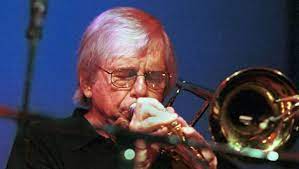Bob Brookmeyer was hardly the first person to belie F. Scott Fitzgerald’s dictum, “There are no second acts in American lives,” but he’s one of the few jazz musicians to have survived the ravages of alcoholism and come back to enjoy a new level of renown separate from what he’d presented in Act One. Brookmeyer, who died on December 15, four days before his 82nd birthday, came to prominence in the 1950’s as a valve trombonist, pianist and arranger for small combos led by Stan Getz, Gerry Mulligan, and Jimmy Giuffre. As his career progressed, his gift for orchestration brought him into a leading role in two of the great big bands of the ’60’s, Mulligan’s Concert Jazz Band, and the Thad Jones-Mel Lewis Orchestra, both of which he joined as a founding member.
Brookmeyer grew up in Kansas City, Missouri, a musical hot house that ignited his passion for jazz. Seeing the Count Basie Orchestra in 1941 provided him with his “first major body thrill…a completely orgasmic feeling,” and the 11-year-old knew then and there that he’d dedicate his life to music. Kansas City swing, which Basie epitomized, remained a guiding light in Brookmeyer’s music, and he found kindred spirits in Mulligan, Giuffre, Jim Hall and other modernists whose music utilized bebop’s harmonic language while preserving Swing Era concepts of phrasing and rhythm. Brookmeyer’s 1957 Pacific Jazz release, Traditionalism Revisited, neatly summarized his affinities. Here he is with Mulligan, Ray Brown and Art Blakey in 1981 playing the Cool Jazz anthem, “Bernie’s Tune.”
As a valve trombonist, Brookmeyer developed a trumpet-like facility for playing complex lines, but he loved earlier masters like Jack Teagarden and Dicky Wells and his use of the plunger mute emulated the expressiveness of Ellington brassmen Tricky Sam Nanton and Lawrence Brown. Not surprisingly, the Ellington effect was especially evident in the wonderful quintet that he and Clark Terry co-led in the mid-’60s. That group and his tenure with Thad and Mel were among the most fulfilling of Brookmeyer’s career, but as work became less plentiful in the late 60’s, he succumbed to a job in Hollywood with Merv Griffin’s television show orchestra.
As he relates in this illuminating and expansive NPR Jazz Profile, “Short of putting a stake through my heart, it was the worst decision I ever made. I went from a world of adults into the world of untalented, ungifted, angry children.” And while he admits that he’d already drunk himself out of New York, his problem with alcohol accelerated as his regret over working in television grew, and he soon lost control of his life as a “functional alcoholic.”
Brookmeyer struggled to get sober, and once he did he took a job as an alcoholism counselor in California. He spent nearly ten years off the scene, seriously contemplating complete retirement from music. But Bill Holman and other former colleagues urged him to return, and in 1978 he re-emerged with a triumphant session entitled Back Again, and a celebrated appearance at the North Sea Jazz Festival with Jim Hall. Notwithstanding this quick confirmation that his chops were undiminished, he felt “full of blank paper,” and his youthful desire to become a composer returned. While in his mid-teens, under the influence of a “little dope,” Brookmeyer was knocked out by the Debussy Nocturnes and Stravinsky’s Firebird Suite, which he described as “a killer.” Now he was eager to “find out how to do this,” but the early results of his compositional ambition were “more Boulez than Basie,” and he admitted that this “musical adolescence” drove him to create works that “made your teeth hurt” and had patrons running for the exits.
Brookmeyer gradually learned to compose pieces that combined his desire to open up the harmonic language of jazz while maintaining some of its more familiar elements. In 1994, he formed the New Art Orchestra which premiered his composition “Celebration” at the Schleswig-Holstein Festival in Lubeck, Germany. “Celebration” was written for and played by Gerry Mulligan at Lubeck, and its eventual recording, which followed Mulligan’s death, featured a brilliant performance by Scott Robinson on baritone saxophone. The Penguin Guide includes New Work/Celebration among its “Core Collection” of select jazz releases. Here he is in 2009 conducting a rehearsal of the Vanguard Jazz Orchestra, the band that succeeded Thad and Mel.
Brookmeyer, who could be acerbic about the jazz business and dismissive of its newly-crowned kings, nonetheless discovered that he had a gift for teaching, for mentoring serious young jazz players, and he joined the faculty of the New England Conservatory in 1995. The bandleader Maria Schneider offered this insight into what was most likely his professorial method when she told The New York Times that Brookmeyer increased “the expectations I had for myself. The kinds of questions he posed challenged the traditional musical boundaries I’d confined myself to. He opened up my world.”
The last time I saw Brookmeyer was at the 2004 IAJE conference in New York where he led New Art in a showcase concert. There was an SRO crowd on hand, a convention hall full of students, educators, and the familiar faces of many established jazz players, all listening intently to a survivor who was still thriving. And there was more to come. Brookmeyer’s 2006 recording, Spirit Music, garnered a Grammy nomination and prompted the critic Terry Teachout to ask, “Is Bob Brookmeyer jazz’s greatest living composer?” In that same year, he was named an NEA Jazz Master, the nation’s highest honor for a jazz artist. And on Kenny Werner’s new release with the Brussels Jazz Orchestra, Institute of Higher Learning, he credits Brookmeyer with being “responsible for the idea of ‘big band’ evolving into what is now known as ‘jazz orchestra’,” and says he belongs with Duke Ellington, Gil Evans, and Thad Jones in the pantheon of composer-orchestrators. Not bad for a second act.
